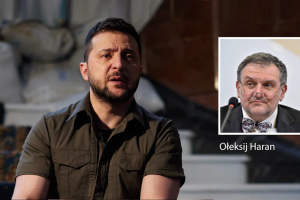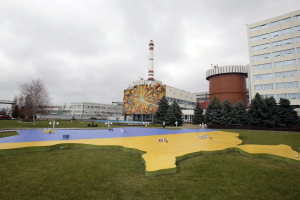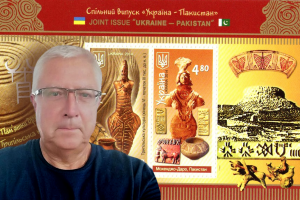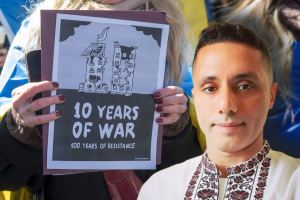This policy brief was prepared exclusively for "Rubryka"
PACE recognizing genocide in Ukraine and G7 excluding Russia from nuclear energy market: key trends in Ukraine’s wartime reality
International Developments
- Russia's MFA head Lavrov presided over the UN Security Council.
Russian foreign affairs minister Lavrov presided over the UN Security Council sitting in the last week of Russian April rotational chairing the UN body.
Lavrov's visit was clouded by the US officials' denying visas to the Russian pool of journalists who were supposed to travel with Lavrov and issuing visas for the official delegation members at the last minute.
That undermined the Kremlin's propaganda efforts tied to this visit and allowed for direct in-person criticism of Russia's official "justifications" of war against Ukraine by the US and British representatives in the UNSC.
- Ukrainian President Zelensky spoke to Chinese leader Xi Jinping.
The long-anticipated phone call came after Chairman Xi visited Moscow and several top European and EU leaders visited Beijing during the last weeks.
As China tries to play an international broker role in settling the Russian-Ukrainian war politically, the delay in talking to the Ukrainian President after China's Xi visited Moscow looked increasingly suspicious.
Chinese strategy seems to gather the reaction of critical Western trade partners in Europe after Beijing made its "peace plan" public and got support from Moscow.
Only after Chinese leadership understood the Western European perception of the move, Beijing called Kyiv.
The call did not mark any immediate shift in further pushing the Chinese "peace plan".
However, one immediate aftermath of the call was that PRC appointed a special representative (a former PRC ambassador to Moscow) to Ukraine and other nations tasked with setting up communications to settle "the Ukrainian crisis", as official Beijing calls aggressive Russian war against Ukraine.
- PACE acknowledged the forced relocation of Ukrainian children shows evidence of genocide.
The Parliamentary Assembly of the Council of Europe (PACE) stated that Russia's forced relocation of Ukrainian children and efforts to impose Russian culture on them "matches the international definition of genocide".
The Assembly called Russia to grant access to the United Nations and International Red Cross and Red Crescent "to gather information on deported children".
- The 11th Ramstein initiative meeting took place in Germany.
Though lacking the usual public details, the meeting was dedicated to preparing Ukrainian forces for the coming major counteroffensive.
This session's top priorities: the anti-air defenses, ammunition supplies and logistics reflect the Ukrainian Armed Forces' urgent needs in planning and executing future offensive moves.
As the first Patriot battery arrived in Ukraine and got fully operational, more are expected to come to compensate for the lack of the Ukrainian Air Force's modern fighter jets' capabilities.
- Great Britain, the USA, Canada, Japan and France created an alliance to push Russia off the international nuclear energy market.
During the G7 meeting in Sapporo, Japan, the five nations agreed to utilize available resources and capabilities of their respective national civilian nuclear sectors to eventually undermine Russia's control over major international civilian nuclear logistics chains.
- EU's normal relations with China depend on Beijing's ability to influence Russia to withdraw its troops from Ukraine.
High Representative of the European Union for Foreign Affairs and Security Policy Josep Borrell announced Tuesday, 18 April, that the EU would be unable to proceed with normal relations with PRC unless Chinese leadership uses its influence over Putin's regime to force the latter to withdraw Russian troops continuing the illegal military aggression against Ukraine.
Addressing the European Parliament session on the EU-China relations strategy, Mr Borrell stressed that any neutrality which makes no difference between the aggressor and its victim means clear siding with the former.
- Russia might be preparing another diversion on the critical international infrastructure.
Northern-European nations' joint investigation showed Russia is getting ready to make a move on international critical infrastructure.
Russia utilizes civilian vessels to gather information on the international critical infrastructure in the Baltic and Northern seas, according to the media investigation of Denmark, Norway, Sweden and Finland.
Russia uses the former Soviet playbook to sabotage critical international infrastructure to further weaken the West, much like Moscow had done by destroying the Nord Stream pipelines.
War/Security Situation
- Russia's Putin supposedly visited occupied territories of Southern Ukraine.
According to the official version, Putin visited Russian regional military commanders in the so-called "Dnepr" Russian force grouping and the so-called "Vostok" national guard headquarters in the occupied Ukrainian Luhansk region.
Putin's voyage was a staged propaganda story to reassure the Russian population that the war goes "as planned" despite the growing fear of the coming major Ukrainian counteroffensive.
Moreover, Putin is using all his opportunities to project the image of a "wartime leader", however lame these efforts might look.
Regarding the coming presidential "elections" in Russia and the fate of the occupied Ukrainian territories in doubt, Putin needs to seize the moment while he still can. In the meantime, he might week look for potential candidates within Russian military commanders' ring to be blamed for future military losses.
Conclusions and Recommendations
- Russia's MFA head Lavrov presided over the UN Security Council at the close of the month Russia chaired the UNSC.
Lavrov's visit to the UN Headquarters in New York marked a rare case that a top member of Putin's regime could travel to the US or another Western nation officially.
Russian presiding over the UN Security Council and Lavrov's speech there were used by Kremlin to spread Russian propaganda narratives further using the UN international platform.
However, the US officially denying visas to the Russian journalist pool effectively undermined Russian propaganda efforts tied to this visit.
- Ukrainian President Zelensky spoke to Chinese leader Xi Jinping.
The call marks the next careful step Beijing takes to use its potential role as an international broker for sitting at the negotiation table to secure a political settlement of the Russian-Ukrainian war and play a critical role in the future global security architecture.
This is a long play by PRC aimed at pursuing its regional goals and geopolitical interests, which make China neither an ally nor an opponent of Ukraine.
It marks Beijing's desire to become a geopolitical player in the strategic competition with the West, uniting nations of the Global South with anti-West sentiments under Chinese auspices.
- The Parliamentary Assembly of the Council of Europe acknowledged the forced relocation of Ukrainian children shows evidence of genocide.
The PACE said they "welcomed the International Criminal Court's decision" to issue the arrest warrants and "urged their enforcement."
According to the ICC, there are "reasonable grounds to believe" that Putin is directly responsible for overseeing the deportations and that he failed to exercise control over the Russian military personnel and civilians who implemented the crime throughout occupied Ukrainian territory since the start of the full-scale invasion.
The PACE official statement marks another step toward bringing to justice members of Russian political and military leadership responsible for committing war crimes and crimes against humanity during the Kremlin's unprovoked military aggression against Ukraine.
- The 11th Ramstein initiative meeting took place in Germany.
Although this week's session did not offer significant public breakthroughs, it focused on urgent issues vital to the coming major Ukrainian counteroffensive.
The international fighter jet coalition pulls its weight as more Western allies send their Soviet-made MiG-29s to Ukraine to be immediately used in combat.
Things seem to move on much like they had with other Western weapons systems already delivered to Ukraine. After the initial hesitation, the West sent over older, Soviet-made equipment, and once its stockpiles depleted, the allies eventually moved to deliver modern, Western-made military tech.
- Great Britain, the USA, Canada, Japan and France created an alliance to push Russia off the international nuclear energy market.
The move means the major players of the G7 are eager to step up international economic pressure on Russia, expanding it into its nuclear energy sector.
The step is highly anticipated, as the Kremlin utilizes its civilian nuclear energy to reach out to international markets to get military components and technology largely restricted under anti-Russian economic sanctions.
If effective, the alliance might further degrade Russian ability to wage aggressive war against Ukraine by denying Moscow crucial resources much needed to replenish its weapons stockpiles.
- EU's normal relations with China depend on Beijing's ability to influence Russia to withdraw its troops from Ukraine.
Brussels is trying to get the maximum out of the EU member states' leaders' recent visits to China.
European nations try to persuade Beijing to use its influence over Russian leadership to force Putin to withdraw Russian troops from Ukrainian territories and stop the military invasion. Considering China's need to boost its economy via international trade with European Union and other key Western players, the EU attempt seems quite logical.
However, its efficiency would eventually depend on other important factors, namely, the results of the anticipated Ukrainian counteroffensive and scaling up Western military assistance to Ukraine. Official Kyiv should stress the link to the key Western allies and global players.
- Russia might be preparing another diversion on the international critical infrastructure.
Due to systematic failures on the battlefields in Ukraine, Russia again seems to go for its hybrid toolkit to balance off the situation. Any future sabotage acts by Russia might be aimed against critical Western infrastructure in the Baltic and/or North Sea and focused on:
- Diverting public attention from Russian military failures in Ukraine.
- Supporting the Russian propaganda machine with additional material.
- Maintaining pressure over the West.
Ukraine should coordinate its battlefield efforts with the West, linking them to possible Russian hybrid escalation internationally.
- Russia's Putin supposedly visited occupied territories of Southern Ukraine.
Putin's lame efforts to look like Ukrainian President Zelensky in terms of visiting the battlefronts and meeting with the troops are aimed solely at the Russian population.
As official Russian propaganda shows doubts about the outcome of the much-expected Ukrainian major counteroffensive and the fear of another mobilization wave spread across Russia, Kremlin needs something to reassure Russians the war goes "as planned," and Putin personally takes care of it.
However, the move likely indicates quite the contrary: with the Ukrainian counteroffensive coming, Putin might not have another chance to demonstrate his lame "war-leader" skills to his population, especially considering the presidential campaign looming closer.
______________________________________
This policy brief was prepared exclusively for "Rubryka" as part of a project "russia-Ukraine Conflict: from Full-Scale War to Conflict Resolution and Post-War Reconstruction" implemented in cooperation with the Razumkov Centre with the support of the MATRA program of the Embassy of the Netherlands. The opinions expressed are those of the author(s) only and should not be considered as representative of the Embassy's official position.








